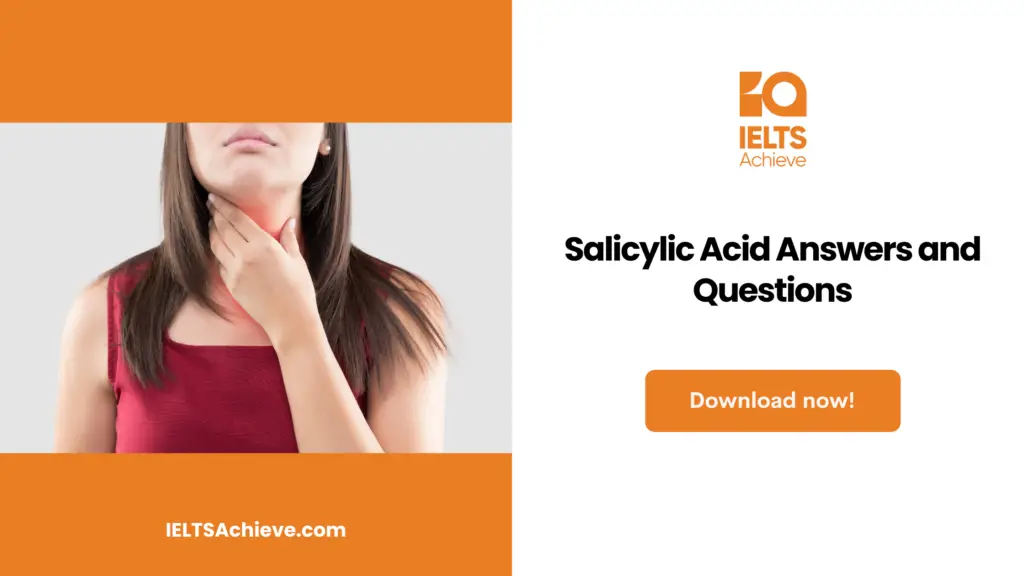The Blog post contains the following IELTS Reading Questions:
- IELTS Reading Multiple Choice Questions
- IELTS Reading Matching Sentence Endings
- IELTS Reading Matching Headings
Stay informed and prepared for success – Explore our comprehensive Reading Test Info page to get valuable insights, exam format details, and expert tips for mastering the IELTS Reading section.
IELTS Reading Passage – Salicylic Acid

Salicylic Acid
The Greek physician Hippocrates observed that a powder obtained from the bark of the white willow tree (Salix Alba) may reduce fevers and relieve pain, after that the effects of salicylic acid were first recorded in the fifth century BC. According to surviving evidence, ancient civilizations in the Middle East and North America also used willow bark for similar reasons. And so far, it was not until 1826 that Johann Andreas Buchner, a German pharmacologist from the University of Munich, distilled and named the active component of willow bark as salicin. A few years later, the procedure of isolation was improved, and the Italian scientist Raffaele Piria accomplished the chemical synthesis of salicylic acid. By the end of the nineteenth century, the German corporation Bayer was commercially selling the medication as tablets under the brand name Aspirin, and it quickly became a mainstay in Western medical cabinets.
Despite the fact that over-the-counter pain medications continue to be the most common use for salicylic acid, its uses have expanded significantly over the years. For example, in the area of dermatology, salicylic acid in the form of skin cream is recognized for its cleaning and complexion-improving properties. Due to its ability to soften and eliminate keratin, a type of “glue” in the skin’s structure, salicylic acid can be utilised to treat a variety of diseases in which the skin has experienced an excessive accumulation or congestion of skin cells. All of these disorders, which include acne, dermatitis, psoriasis, and folliculitis, have shown remarkable resistance to other treatments. Salicylic acid also has anti-inflammatory characteristics and, as a consequence, may calm irritated skin, whilst other medications tend to worsen the issue.
While it has a reputation as a ‘gentle’ chemical in comparison to other alternatives, salicylic acid creams in high dosages may be dangerous and sometimes deadly. Long-term use of highly concentrated salicylic acid, specifically amounts used to remove warts, corns, and calluses, may result in chemical burns. Hyperpigmentation, a blotchy darkening of skin tone, may also occur in individuals with darker skin and those who expose themselves to excessive UV radiation after treatment. For this reason, the majority of over-the-counter face creams have a concentration range of 2% to 3%.
Moreover, salicylic acid has a variety of fewer applications. Because of its antibacterial qualities, it is used to produce bismuth subsalicylate, the active component in a variety of popular treatments for stomach distress and other intestinal issues. Some research shows that salicylic acid may eliminate E. coli. Coli Bacteria and, as a result, lowers diarrhoea and gastrointestinal discomfort in numerous patients. The buildup of bismuth subsalicylate in the body is harmful, hence its usage over the long term is prohibited.
Salicylic acid in the form of aspirin tablets is commonly used to reduce fever, aches and pains, and inflammation; however, when consumed, it can cause gastrointestinal ulcers, stomach irritation or bleeding, as well as other undesirable side effects, which have been a problem for many aspirin users over the years. Epidemiological study indicates a correlation between the use of aspirin in children with a viral illness and a potentially fatal condition known as Reye’s syndrome. Children appear to be especially vulnerable, as aspirin use in children with a viral illness has been linked to the potentially fatal Reye’s syndrome. As a consequence, the Food and Drug Administration has urged parents to avoid giving aspirin to all kids and teenagers with fever.
In addition to its extensive use in human and animal medicine, salicylic acid is also important to the survival of many plant species. It seems to prevent fungal and bacterial infections by discouraging their development. Because of its involvement in plant responses to abiotic conditions including drought, extreme cold or heat, and heavy metal toxicity, it also functions as a therapeutic agent of sorts.
It’s a component found in many different kinds of fruit, such as berries, dates, raisins, kiwis, olives, and tomatoes. Along with a few vegetables, mushrooms, and almonds have a strong salicylic acid content. Rowett Research Institute found that a very spicy curry had more salicylic acid than a dose of aspirin due to the high levels of turmeric and curcumin used to make the dish.
In order to protect some patients against heart attacks, strokes, and blood clot formation, some doctors advise their patients to take aspirin on a regular basis at very low doses. There is growing evidence that it may help prevent certain forms of cancer. However, it is not recommended that healthy people begin taking daily aspirin as a preventative measure, as positive lifestyle changes can be made instead: quitting smoking, consuming little or no alcohol, and maintaining a normal weight by eating a healthy diet and engaging in regular physical activity. These alterations to one’s lifestyle may not be simple, but they are tremendously advantageous in the long term. If withdrawal symptoms are intense (from nicotine or coffee, for instance), you might take a few aspirin to relieve the brief pain.
Unlock your full potential in the IELTS Reading section – Visit our IELTS Reading Practice Question Answer page now!
Recommended Questions:
Renewable Energy IELTS Reading Question with Answer
Salicylic Acid IELTS Reading Questions
Questions 1
Choose the correct letter, A, B, C or D. Circle the correct letter in
1. What is the writer’s overall purpose in writing this article?
- To examine the key properties of salicylic acid and how it functions
- To outline uses and effects of salicylic acid in various contexts
- To show the benefits of salicylic acid compared to other treatments
- To warn against the dangers of misusing salicylic acid
Ready to improve your performance in Multiple Choice Questions (MCQs)? Click here to access our comprehensive guide on how to tackle MCQs effectively in the IELTS Reading section.
Questions 2-5
Complete each sentence with the correct ending, A – G, below.
Write the correct letter in your answer sheet.
- can cause high temperatures and sore muscles
- is usually sold in high concentrations
- kills germs inside the body
- may result in a serious disease or even death
- reduces the sticky effects of blocked up cells
- resists the progress of many diseases
- changes the colour of the skin
2. Salicylic acid is used on the skin because it _____________
3. Some users of salicylic cream have issues because it ________
4. Aspirin is used for stomach problems because it _________
5. Young people should not consume Aspirin because it _________
Ready to sharpen your skills in Matching Sentence Endings? Click here to discover expert strategies and techniques for accurately matching sentence endings with the corresponding information in the IELTS Reading section.
Questions 6-13
Reading Passage has seven paragraphs, A–H. Choose the correct heading for each paragraph from the list of headings below. Write the correct number, i–xi, in your answer sheet.
List of Headings
- Availability to the public
- Risks of application to the skin
- Use as a digestive aid
- Early popularity in Europe
- Edible sources of salicylic acid
- Discovery and development
- Unwanted side effects of swallowing aspirin
- External uses of salicylic acid
- Appropriate and inappropriate long-term uses
- A remedy for sick children
- Benefits for plant life
6. Paragraph A
7. Paragraph B
8. Paragraph C
9. Paragraph D
10. Paragraph E
11. Paragraph F
12. Paragraph G
13. Paragraph H
Ready to conquer Matching Headings questions? Click here to learn essential tips and techniques for matching headings accurately to paragraphs or sections in the IELTS Reading section.
Unlock your full potential in the IELTS Reading section – Visit our IELTS Reading Practice Question Answer page now!
Recommended Questions:
Renewable Energy IELTS Reading Question with Answer
Salicylic Acid Reading Answers
1. B
2. G
3. A
4. F
5. D
6. vi
7. viii
8. ii
9. iii
10. vii
11. xi
12. v
13. ix

We hope you found this post useful in helping you to study for the IELTS Test. If you have any questions please let us know in the comments below or on the Facebook page.
The best way to keep up to date with posts like this is to like us on Facebook, then follow us on Instagram and Pinterest. If you need help preparing for the IELTS Test, join the IELTS Achieve Academy and see how we can assist you to achieve your desired band score. We offer an essay correction service, mock exams and online courses.

